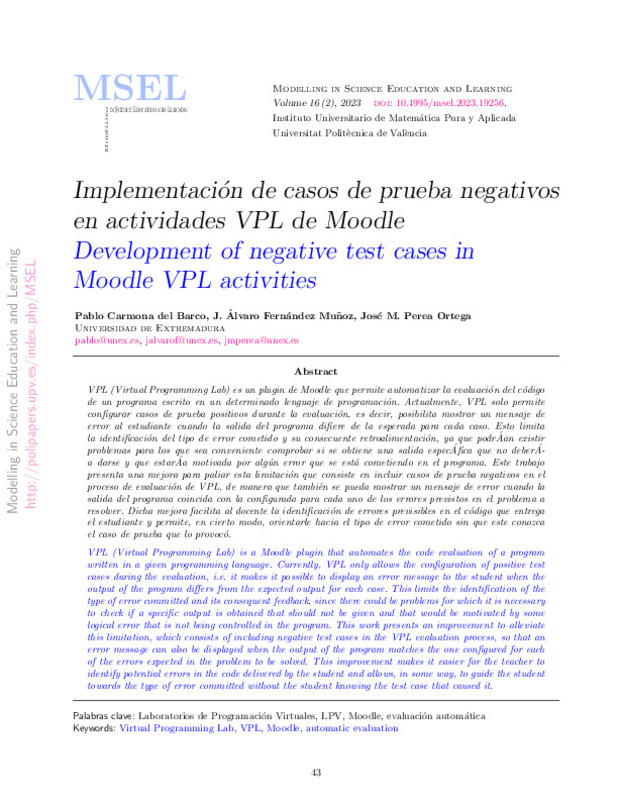JavaScript is disabled for your browser. Some features of this site may not work without it.
Buscar en RiuNet
Listar
Mi cuenta
Estadísticas
Ayuda RiuNet
Admin. UPV
Implementación de casos de prueba negativos en actividades VPL de Moodle
Mostrar el registro sencillo del ítem
Ficheros en el ítem
| dc.contributor.author | Carmona del Barco, Pablo
|
es_ES |
| dc.contributor.author | Fernández Muñoz, J. Álvaro
|
es_ES |
| dc.contributor.author | Perea Ortega, José M.
|
es_ES |
| dc.date.accessioned | 2023-11-06T12:19:43Z | |
| dc.date.available | 2023-11-06T12:19:43Z | |
| dc.date.issued | 2023-07-28 | |
| dc.identifier.uri | http://hdl.handle.net/10251/199288 | |
| dc.description.abstract | [ES] VPL (Virtual Programming Lab) es un plugin de Moodle que permite automatizar la evaluación del código de un programa escrito en un determinado lenguaje de programación. Actualmente, VPL solo permite configurar casos de prueba positivos durante la evaluación, es decir, posibilita mostrar un mensaje de error al estudiante cuando la salida del programa difiere de la esperada para cada caso. Esto limita la identificación del tipo de error cometido y su consecuente retroalimentación, ya que podrían existir problemas para los que sea conveniente comprobar si se obtiene una salida específica que no debería darse y que estaría motivada por algún error que se está cometiendo en el programa. Este trabajo presenta una mejora para paliar esta limitación que consiste en incluir casos de prueba negativos en el proceso de evaluación de VPL, de manera que también se pueda mostrar un mensaje de error cuando la salida del programa coincida con la configurada para cada uno de los errores previstos en el problema a resolver. Dicha mejora facilita al docente la identificación de errores previsibles en el código que entrega el estudiante y permite, en cierto modo, orientarle hacia el tipo de error cometido sin que este conozca el caso de prueba que lo provocó. | es_ES |
| dc.description.abstract | [EN] VPL (Virtual Programming Lab) is a Moodle plugin that automates the code evaluation of a program written in a given programming language. Currently, VPL only allows the configuration of positive test cases during the evaluation, i.e. it makes it possible to display an error message to the student when the output of the program differs from the expected output for each case. This limits the identification of the type of error committed and its consequent feedback, since there could be problems for which it is necessary to check if a specific output is obtained that should not be given and that would be motivated by some logical error that is not being controlled in the program. This work presents an improvement to alleviate this limitation, which consists of including negative test cases in the VPL evaluation process, so that an error message can also be displayed when the output of the program matches the one configured for each of the errors expected in the problem to be solved. This improvement makes it easier for the teacher to identify potential errors in the code delivered by the student and allows, in some way, to guide the student towards the type of error committed without the student knowing the test case that caused it. | es_ES |
| dc.language | Español | es_ES |
| dc.publisher | Universitat Politècnica de València | es_ES |
| dc.relation.ispartof | Modelling in Science Education and Learning | es_ES |
| dc.rights | Reconocimiento - No comercial (by-nc) | es_ES |
| dc.subject | Laboratorios de Programación Virtuales (LPV) | es_ES |
| dc.subject | Virtual Programming Lab (VPL) | es_ES |
| dc.subject | Moodle | es_ES |
| dc.subject | Automatic evaluation | es_ES |
| dc.subject | Evaluación automática | es_ES |
| dc.title | Implementación de casos de prueba negativos en actividades VPL de Moodle | es_ES |
| dc.title.alternative | Development of negative test cases in Moodle VPL activities | es_ES |
| dc.type | Artículo | es_ES |
| dc.identifier.doi | 10.4995/msel.2023.19256 | |
| dc.rights.accessRights | Abierto | es_ES |
| dc.description.bibliographicCitation | Carmona Del Barco, P.; Fernández Muñoz, JÁ.; Perea Ortega, JM. (2023). Implementación de casos de prueba negativos en actividades VPL de Moodle. Modelling in Science Education and Learning. 16(2):43-50. https://doi.org/10.4995/msel.2023.19256 | es_ES |
| dc.description.accrualMethod | OJS | es_ES |
| dc.relation.publisherversion | https://doi.org/10.4995/msel.2023.19256 | es_ES |
| dc.description.upvformatpinicio | 43 | es_ES |
| dc.description.upvformatpfin | 50 | es_ES |
| dc.type.version | info:eu-repo/semantics/publishedVersion | es_ES |
| dc.description.volume | 16 | es_ES |
| dc.description.issue | 2 | es_ES |
| dc.identifier.eissn | 1988-3145 | |
| dc.relation.pasarela | OJS\19256 | es_ES |
| dc.description.references | Amaya Berssanette, J. H., y De Francisco, A. C. (2021). Active learning in the context of the teaching/learning of computer programming: A systematic review. Journal of Information Technology Education: Research, 20. https://doi.org/10.28945/4767 | es_ES |
| dc.description.references | Cardoso, M., Vieira, A., y Rocha, A. (2018). Integration of virtual programming lab in a process of teaching programming EduScrum based. En Iberian Conference on Information Systems and Technologies, CISTI. https://doi.org/10.23919/CISTI.2018.8399261 | es_ES |
| dc.description.references | Cheah, C. S. (2020). Factors contributing to the difficulties in teaching and learning of computer programming: A literature review. Contemporary Educational Technology, 12. https://doi.org/10.30935/cedtech/8247 | es_ES |
| dc.description.references | Rodríguez del Pino, J. C., Rubio Royo, E., y Hernández Figueroa, Z. (2010). VPL: laboratorio virtual de programación para Moodle. | es_ES |
| dc.description.references | En XVI Jornadas de Enseñanza Universitaria de la Informática. https://upcommons.upc.edu/bitstream/handle/2099/11840/r51.pdf | es_ES |
| dc.description.references | Rodríguez del Pino, J. C., Rubio Royo, E., y Hernández Figueroa, Z. (2012). A virtual programming lab for Moodle with automatic assessment and anti-plagiarism features. En The Internacional Conference on e-Learning, e-Business, Entreprise Information Systems, & e-Government. http://worldcomp-proceedings.com/proc/p2012/EEE3753.pdf | es_ES |








